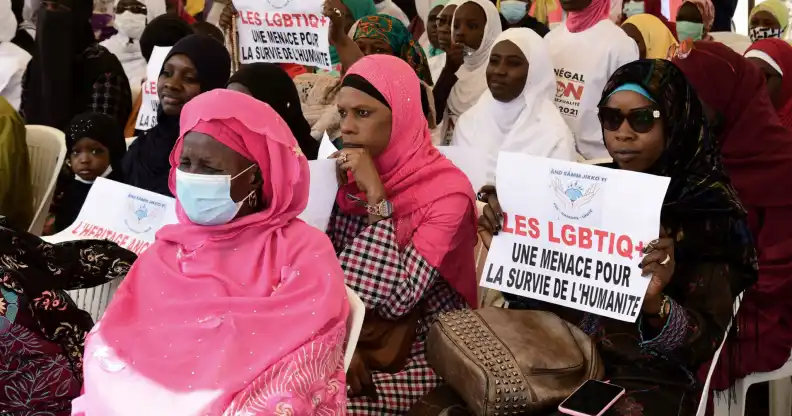Senegal rejects chilling bill that would have doubled punishment for gay sex and criminalised allies

A woman holds a sign reading ‘LGBT is a threat for humanity’ during a protest called by religious associations against homosexuality in 2021. (SEYLLOU/AFP via Getty Images)
Lawmakers in Senegal have rejected a chilling bill that would have doubled punishment for gay sex, and criminalised allies who advocate for LGBT+ rights.
Senegal is one of 28 out of 45 countries in sub-Saharan Africa that criminalises homosexuality.
The country currently punishes “acts against nature” with five years in prison and a fine, but a group of 15 members of Senegal’s national assembly announced a bill last month which would have doubled this to 10 years, plus a fine.
The bill would also have imprisoned intersex people for up to 10 years, claiming they are “adept at all imaginable sexual orgies”, and would have imposed a fine and a three to five year prison sentence for anyone advocating for queer rights or the decriminalisation of homosexuality.
This would have been enforceable even if statements in support of the queer community were made on private social media pages.
The bill, which grassroots activists has been years in the making and is fuelled by anti-LGBT+ lobbying collective Ànd Sàmm Djikko Yi, compares LGBT+ people to “bestiality, necrophilia and other related practices”.
Thankfully, parliamentary lawmakers in Senegal have now rejected the anti-LGBT+ bill.
According to Erasing 76 Crimes, a publication which “focuses on the human toll of 76+ countries’ anti-LGBTI laws and the struggle to repeal them”, chairman of the parliamentary majority group Aymérou Gningue described the bill as a “false debate”.
He said that gay sex is “already clearly banned and punished by law in Senegal” and added: “The current law in Senegal, which dates from 1966… is clear on this subject. There is no need to add or remove a comma.”
Senegal’s elections are scheduled for 23 January, and Gningue accused the national assembly members who introduced the bill of “political instrumentalisation”, saying they were trying to “install a false debate in this pre-election period” to “hide unavowed political objectives”.

